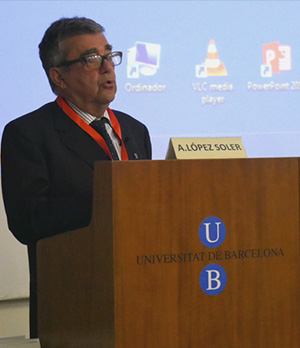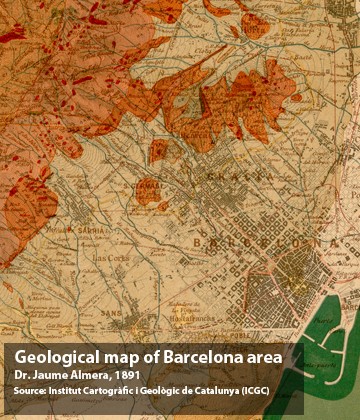Our mission
Geociencias Barcelona (GEO3BCN – CSIC) is an international geosciences research institute whose mission is to advance the understanding of Earth System Science. We will achieve this by applying advanced (forefront) experimental and analytical methodologies to well-defined, knowledge-driven research objectives. A key part of our mission is to meet industrial and societal needs through knowledge transfer applied to geohazards and exploration and exploitation of geological resources. Central to our mission is quality training of the next generation of Earth Science researchers and technicians.
Our vision
GEO3BCN vision is to enhance key areas in knowledge-driven research and to use this knowledge to meet major industrial and societal challenges in:
- Earth Systems Science.
- Subsurface characterization and monitoring.
- Increase our support of early career researchers.
- Characterization and assessment of geological, environmental, and climate hazards.
These challenges intersect with:
- Identify new and emerging research opportunities.
- Enhance our training capabilities of the next generation of Earth scientists.
- Raise our level of international collaboration.
History

1965
It was created a new institute called Instituto Jaume Almera de Investigaciones Geológicas (IJAIG), under the direction of Lluís Solé Sabarís. This Institute grouped the sections of the Institute Lucas Mallada located at the University of Barcelona and its research was focused on the Geological Sciences with major emphasis in the regions near Barcelona.

1978-1979
The IJAIG became a center of the CSIC, independent of the University of Barcelona, being Ángel López Soler new director of the Institute. The structure of the Institute comprised 4 Structural Research Units (UEI) until 1981: Biostratigraphy, Regional and Marine Geology, Mineralogy and X-ray Diffraction and Crystal Structures.

1981-1983
The construction and inaguration of the present building of the Institute in the Pedralbes Campus of University of Barcelona.
1984
The name of the center changed to Instituto de Investigaciones Geologicas Jaume Almera (IIGJA) and it was composed of 2 Structural Research Units (UEI): Marine Geology and Resources and Materials.
1986
The Marine Geology Unit was assigned to the Instituto de Ciencias del Mar (ICM-CSIC). Another group of researchers from the IIGJA became part of the Instituto de Ciencias de Materiales of Barcelona (ICMAB-CSIC) which was created that year.

1987- 1992
The Institute was made up of 2 Structural Research Units (UEI): Environmental Geology and Geophysics. The institute was renamed as Instituto de Ciencias de la Tierra Jaume Almera (ICTJA), under the direction of Enric Banda.
1993 -2005
The ICTJA had three Structural Research Units (UEI): Geophysics, Environmental Geology and Natural Hazards. Ángel López Soler became director between 1991 and 2000, Montserrat Torné between 2000 and 2001, and Carlos Ayora between 2001 and 2005.
2006
Being director Manel Fernández, the Institute was reorganized into 4 departments: Sedimentary Geology, Environmental Geosciences and Crystallography, Structure and Dynamics of the Earth, and Geophysics and Geohazards.
2008
There was a restructuring of CSIC and a group of researchers from the Institute together with researchers from the Instituto de Investigaciones Químicas y Ambientales and from the Instituto de Biología Molecular de Barcelona created the new Instituto de Diagnóstico Ambiental y del Agua.
2009
ICTJA had 2 research departments: Earth’s Structure and Dynamics and Crystallography, and Environmental Geology and Geohazards.
2013 – 2019
From 2013 to 2019, following the recommendations of CSIC, the ICTJA, being director Montserrat Torné (2012-2015), developed the research strategy for the 2014-2017 period. This strategy was subsequently further developed and implemented by the next director, José Luis Fernández Turiel (2015-2019), who was also responsible for implementing the current PRL plan.

2020
In 2020 the Institute, under the direction of Joan Martí (2019-2022), has experienced a complete restructuring, mergin the existing research groups into just a single one and removing the existing research departments. This unique research group will devote its efforts to achieve three main research challenges focused on global geodynamics and its relation to the mineral and energetic resources and extreme hazards. Without abandoning basic research, this new endeavor wants to provide solutions to some of the main issues that our society has to become safer and more sustainable.
Organization Chart

